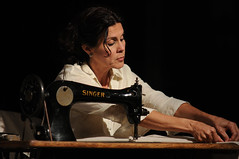Invited Speakers:
Abilio Estévez / Antonio José Ponte
Thomas Anderson Rafael Rojas Arcadio Díaz Quiñones
Gerard Aching Juan Carlos Quintero-Herencia José Quiroga
Jorge Brioso Ana María Dopico Licia Fiol-Matta
Enrique del Risco Noel Luna Aurea María Sotomayor
Javier Guerrero Mariana Amato Modesto Milanés
Virgilio Piñera is, without a doubt, one of the most representative, prolific, and influential of Cuban writers. He was born in Cárdenas, Cuba, in 1912 and died in Havana, Cuba in 1979.
Piñera was a poet, novelist, short story writer, essayist, and journal editor. He is Cuba’s most important playwright and one of Latin America’s top playwrights of the twentieth century. Among his best-known works, Piñera is the author of arguably Cuba's most memorable poem, “La isla en peso” [The island and its weight, 1943]; a stunning novel, La carne de René [René’s Flesh, trans. Marc Schafer, orig. 1952]; and modernist short stories collected in Cuentos fríos [Cold Tales, trans. Marc Schafer, orig. 1956]. His dazzling theater output consists of more than twenty plays, all revolving around the theater of the absurd and on a par with European greats such as Samuel Beckett or Eugene Ionesco: Electra Garrigó, Aire frío, Dos viejos pánicos, Una caja de zapatos vacía, and many others.
After the Cuban Revolution’s 1959 triumph, Piñera, like many other writers, joined the ranks of writer-workers that Cuban leaders spoke of creating. In 1968, he won Cuba’s top literary prize, the Premio Casa Las Américas, for his play Dos viejos pánicos. Yet, having fallen out of grace with the Cuban Revolution for his dissent and homosexuality, he spent his last years in oblivion. By 1971, Piñera became a completely marginal figure up to his death, despite his considerable literary stature.
Piñera was a master of the art of the absurd and of Artaud’s theater of cruelty. His poetry presented an up to then unknown exploration of the unconscious and its formal possibilities, an angle he also pursued in his fiction. He was, paradoxically, a simultaneously central and marginal figure in Cuban literature and art, and his work has only recently begun to receive the attention it so markedly deserves because of its high quality, its literary impact on multiple writers of his and subsequent generations, and the silencing to which he was subjected at various points in his career.
Several events honoring his life and work have taken place in Cuba, Puerto Rico, Mexico and Miami through 2012, a long overdue recognition of Virgilio Piñera's achievements and signal importance in Cuban, Latin American, and world literature. Aside from his importance in Cuban letters, Piñera is essential in filling the lacunae in the global genealogy of gender and queer studies, and a cornerstone of performance art and epistemologies of the body as such. The discussion of his oeuvre will be of interest to scholars working at the crossroads of poetics, gender, performance, and politics. Our invited speakers will directly address aspects of Piñera’s work and address the state of the field in Caribbean studies.
http://www.stonybrook.edu/commcms/hispanic/events/Virgilio%20Pi%EF%BF%BDera%20Centennial%20Conference%20Poster.jpg



0 comments:
Publicar un comentario